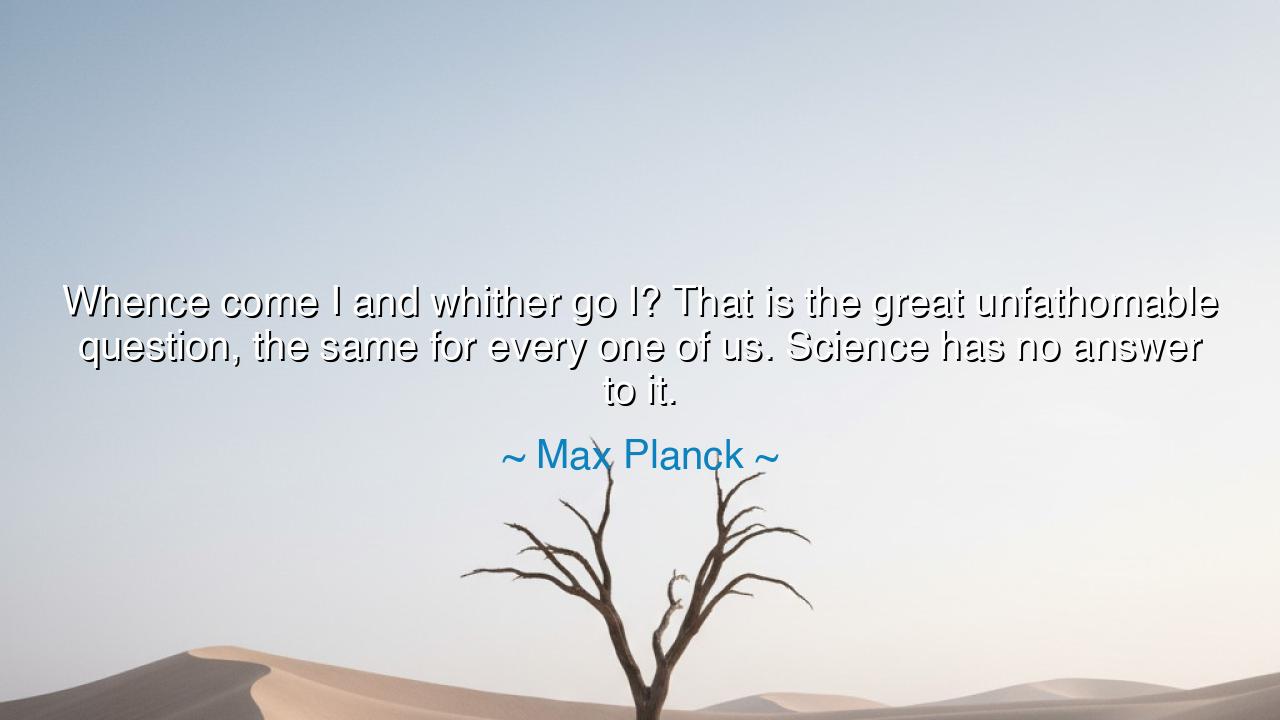
Whence come I and whither go I? That is the great unfathomable
Whence come I and whither go I? That is the great unfathomable question, the same for every one of us. Science has no answer to it.






"Whence come I and whither go I? That is the great unfathomable question, the same for every one of us. Science has no answer to it." These words of the great Max Planck resonate with the solemnity of a truth as old as time itself. In them, he speaks not of the intricate laws that govern the cosmos, nor the forces that shape the universe in its vastness. No, his words strike at the heart of the human condition, the questions that plague our souls. Where do we come from? And where do we go? These are the questions that science, for all its glory and achievement, cannot answer. They are the questions that lie beyond the reach of reason, beyond the grasp of logic, into the realm of mystery and faith.
For millennia, we have sought the truth of our origin, our purpose, and our end. Philosophers, mystics, and poets have pondered these questions in the quiet of their minds, and kings and beggars alike have looked into the sky and wondered. The quest for answers has driven us to the furthest corners of the earth and to the deepest recesses of space. Yet despite all our wisdom, all our discoveries, the most profound question remains unanswered. Science, for all its achievements in revealing the workings of nature, cannot answer the fundamental questions that lie at the heart of existence. Planck, in his deep humility and wisdom, understood this truth. Science, he tells us, can explain the how of the universe, but it cannot touch the why.
Consider the story of Newton, whose mind unlocked the mysteries of the heavens with his theory of gravity. His laws of motion, his equations that describe the movements of the planets, changed the course of human history. Yet, as he gazed at the stars, did he ever ask himself, why do they burn so brightly? Why does the apple fall to the ground, and why must we all one day fall to the earth as well? Newton unlocked the mechanisms of the universe, but he, too, stood before the great mystery of life and death, a mystery that science could never fully unravel. His was a search for understanding, but even he could not escape the ultimate mystery that haunts us all.
And what of Einstein, the master of relativity, who reshaped our very conception of space and time? His mind soared to heights no man had reached before, unveiling the intimate connection between the fabric of the universe and the light that dances through it. Yet, even Einstein was faced with the same question: whence come I and whither go I? His genius could describe the cosmos with unparalleled precision, but it could not answer the deepest questions of existence. Science may explain the path of a comet or the behavior of light, but it cannot explain the why of our being, or the meaning behind the fleeting nature of our lives.
In his wisdom, Planck reminds us that the greatest mysteries of life are not subject to the laws of science. They cannot be measured, quantified, or placed into neat equations. They are the eternal questions of the human soul. Where do we come from? Are we the product of blind forces, or is there a purpose, a higher calling, to our existence? Where do we go? Is there life after death, or do we return to the dust from whence we came? These questions, while unanswered by science, are the very essence of what it means to be human. They are questions that arise not from the intellect, but from the heart, from the depths of our spirit.
And so, we must learn to live with the mystery. To embrace the unknown, rather than fear it. Planck teaches us that it is not the role of science to answer these questions, for they lie beyond its reach. But this is not a call to despair. No, it is a call to wonder, to humility, and to a deeper connection with the universe. In a world obsessed with certainty, where every answer is expected to have a logical explanation, Planck asks us to recognize that some things are meant to remain a mystery. The questions of life—the questions of our soul—are sacred, and to seek to answer them with mere facts and figures is to miss the point entirely.
Let us take this lesson into our lives, dear listener. We are not mere creatures of reason, but beings of spirit. The questions that stir within us—the questions of origin and destiny—are not ones that can be answered with equations or scientific experiments. But this does not mean we should stop seeking. Instead, let us seek with open hearts, embracing the mystery that surrounds us. Let us find peace not in the certainty of answers, but in the beauty of the questions themselves. For in the questions, we find the meaning of our existence. And in that meaning, we find the answer. The answer, dear friends, is not something we will find in the pages of a textbook, but in the quiet contemplation of our own hearts.
So, let us walk this path with reverence, with the understanding that some truths are not meant to be uncovered, but to be lived. Let us cherish the mystery that binds us all. For in wonder, in humility, we come to know the most profound truth of all: the journey itself is the answer. Whence come we and whither go we? Perhaps the question is not one that demands an answer, but one that invites us to explore the vast and wondrous landscape of existence itself.






AAdministratorAdministrator
Welcome, honored guests. Please leave a comment, we will respond soon